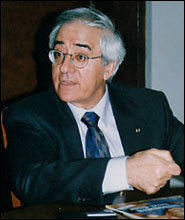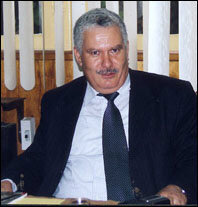
|

 Introduction - Privatization - Partnerships - Investment - Oil and Gas - Mining - Introduction - Privatization - Partnerships - Investment - Oil and Gas - Mining -
Electricity - Building for the future - Telecoms - Air and Sea - Private Sector - Finance -
Going Public - Image is everything - Tourism - Conclusion 
 PRIVATISING OR NOT? PRIVATISING OR NOT? |
Council of Privatization
Recent protests by the Kabyle people in Algeria have been marked by a common theme: the desire to move ahead and develop a country that is democratic, modern and prosperous. Moved by these urgent issues and willing to diversify its exchanges, the only solution for Algeria is to encourage economic growth and pursue its economic liberalization, which started in 1990. This will enable Algerian companies to pull out of economic stagnation, and attract foreign investment in all sectors. Commonly known in Algeria as "second generation reforms", this program aims at radically changing State-run companies' environment by introducing administrative flexibility, lowering fiscal pressure, and most importantly by disengaging the State from all economic sectors. The State would thus serve a controlling and regulatory purpose. With this objective in mind, President Bouteflika formed a government with the eight coalition parties that support him, while awarding the key portfolios of Finance, Privatization, Trade and Energy to personalities of his entourage. According to President Bouteflika's program, the government promises to change economic regulations to make them more attractive, while encouraging partnerships and privatizations to revive the ailing public sector.
This last point is not simply an ideological choice: the State is Algeria's largest employer, with a total of more than 3.5 million civil servants relying on the public sector. To keep these companies alive, the State spent about $10 billion during the past ten years in a number of financial restructuring operations, but unfortunately economic growth did not follow.
It is therefore up to the Prime Minister, Ali Benflis, and the Minister of Participation and Coordination of Reforms to implement the modernization and privatization of the public sector. Everything is up for review; the previous government structure, with five public holdings that hold all the capital of public companies for the State, will be completely re-structured, and privatization will be dictated by new government policies.

According to Hamid Temmar, former Minister of Participation, and current Minister of Trade, "everything can be privatized, by selling it completely or partially through shares or management contracts". The objective is not to privatize for the sake of privatizing, but "to transform the Algerian economy and change the country's economic system. Given that most of the industrial sector is in the hands of the State, the transformation of the public sector through privatization aims at modernizing the national economy and increasing its production capacity."
Temmar calls on investment banks specialized in the relevant sectors to take part in the process. He believes that one third of all public companies must be privatized "with complete transparency".
"The short term objective is to privatize a minimum of 60 to 70 companies within one year to enable us to measure our own capacity and test the market."
This optimism might sound good, but nothing is worth concrete actions. In January 2000, when Temmar was poised to change a number of laws that hindered the acceleration of the privatization process, he hit a wall. A conflict arose on this issue between him and former Prime Minister, Ahmed Benbitour, who sided with labor unions and public managers by opposing the implementation of painful privatization measures.
| The current Prime Minister, Ali Benflis, is open to change but also weary of angering labor unions, and this year Temmar started a long consultation process in an effort to reach a consensus. "After sending the reform bill to the trade unions and management boards for discussion, the Government will take their opinions and advice into account." The opposition to Temmar's reforms is mainly led by the UGTA (the General Union of Algerian Workers), the main trade union in Algeria with 1 million members. It was the UGTA who organized a series of general strikes last March to protest against the Government's project to privatize Sonatrach, the national oil and gas company.
Today the rhetoric has already changed, and there are no longer talks of radical privatizations. "Partnerships" is the new catchword, and it looks more and more like Algerian government policy is leaning towards a gradual opening of State companies, preferring strategic partnerships and joint ventures to the painful and complicated process of privatization.
Certain state-owned companies are even looking a shortcut: informal partnerships for specific business ventures. "When we talk about a large company like SNVI (the National Industrial Vehicle Company, a vertically integrated bus and truck manufacturing giant), finding a partner is never easy", says Mr. Benslimane, General Manager of the Manufacturing and Electricity Holding Company, HOMELEC. "It is easier for us to find a foreign investor who will collaborate with us for specific business ventures, like the manufacturing of television components with ENIE (the national television and VCR manufacturer), car or truck parts with SNVI, or public works material with ENMTP."
Recently all government holdings, including HOMELEC, have been dismantled to create smaller, sectorial equity management companies. Privatization Minister, Noureddine Boukrouh believes that this measure will speed up privatization and attract new investment to the country.
"At the end of the day, our preference is a positive result", adds Benslimane, who has been tirelessly leading an international outreach strategy to transform Algeria into a manufacturing hub for European markets.

Whether referring to "privatization", or "partnership", GIPEC(Groupe Industriel de Papier et de Cellulose) is also at the forefront of this liberalization trend. Algeria's leading pulp and paper company is streamlining its operations, and modernizing its facilities in order to meet an increased demand for paper-based products. "Today, Algeria consumes over 420.000 T of paper - the equivalent of USD 200 million worth of business", says Mustapha Merzouk, Managing Director of GIPEC. Although GIPEC has a production capacity of 300.000 T, a good deal of the local market is supplied by imports, so Merzouk is working to develop local production in an effort to decrease costs, and increase GIPEC' s market share. Plants are being upgraded and foreign consultants have also developed a business plan for GIPEC. "Our corporate strategy is to open the Group to national or international partnerships, to develop a privatization plan, and of course, to improve our management and customer services". This three-fold plan seems to be the right direction for GIPEC, consolidating its potential while opening its doors to investors. |
© World INvestment NEws, 2001.
This is the electronic edition of the special country report on Algeria published in Forbes Global Magazine. 12th November, 2001 Issue.
Developed by AgenciaE.Tv Communication |
|
|
| |
| | | |
|

